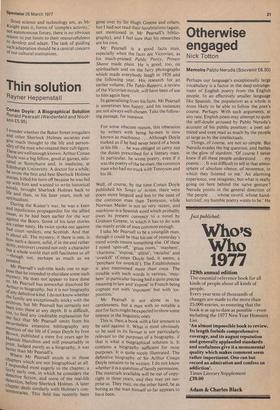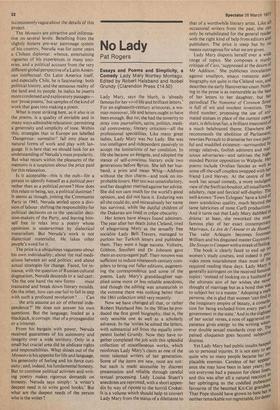Otherwise engaged
Nick Totton
Memoirs Pablo Neruda (Souvenir £6.50) Perhaps our language's exceptionally large vocabulary is a factor in the deep estrangement of English poetry from the English people. In an effectively smaller language like Spanish, the population as a whole is more likely to be able to follow the poet's course. Perhaps. With such arguments, at any rate, English poets may attempt to quiet the self-doubt aroused by Pablo Neruda's account of his public position : a poet admired and even reaclas much by the people at large as by the intellectuals.
Things, of course, are not so simple. But Neruda evades the big question, and bathes in the glow of stardom. 'Of course I never knew if all these people understood . . . my poems ... It was difficult to tell in that atmosphere of absolute silence, of reverence, in which they listened to me.' An alarming experience, one imagines; but what is really' going 'on here behind the naive gesture? Neruda points in the general direction of 'the people . . . whose sword, whose handkerchief, my humble poetry wants to be.' He is consisten tly vague about the details of this project.
The Memoirs are attractive and informative on several levels. Benefiting from the slightly bizarre pre-war patronage system of his country, Neruda was for some years a Chilean diplomat : whence, entertaining vignettes of his experiences in many societies, and a political account from the very different global perspective of a Latin American intellectual. On Latin America itself, and especially Chile, he is fascinating: both political history, and the sensuous reality of the land and its people. In italics he jnserts more condensed and exploratory passages— not 'prose poems,' but samples of the kind of work that goes into making a poem.
What is most striking here, as it also is in the poems, is a quality of enviable and in many ways admirable relaxation ; permitting a generosity and simplicity of tone. Within this, strategies that in Europe are labelled 'Dangerous: surrealist!' fall into place as natural forms of work and play with language. It is here that we should look for an understanding of Neruda's mass popularity. But what recurs within the pleasures of the memoirs is a suspicion about the price paid for this relaxation.
Is it acceptable—this is the nub—for a person to identify himself as a political poet rather than as a political person? How does this relate to being, say, a political dustman? It seems as though, joining the Communist Party in 1945, Neruda settled upon a division of labour : shifting the responsibility for political decisions on to the specialist decision-makers of the Party, and leaving himself free to relax into a poetry whose optimism is underwritten by dialectical materialism. But Neruda's work is not dialectical materialist. He takes other people's word for it.
The price is a ubiquitous vagueness about his own individuality; about the real mediations between art and politics; and about actual strategies for change. Faced, for instance, with the question of Russian cultural dogmatism, Neruda descends to a sad cant: 'On the one hand the new forms . . . must transcend and break down literary moulds. On the other, how can one fail to fall in step with such a profound revolution ? . . . Can . . . the arts assume an air of ethereal independence?' He does not answer his own questions. But the language, loaded as a blackjack, is corrupt : that of a propagandist or a trimmer.
From his bargain with power, Neruda received guarantees of his autonomy and integrity over a wide territory. Only in a small but crucial area did he abdicate rights and responsibilities. What shines out of the Memoirs is his appetite for life and language, his generosity of feeling and his fierce curiosity; and, indeed, his fundamental honesty. But to combine political activism and writing poetry makes rigorous demands on honesty. Neruda says simply: 'a writer's deepest need is to write good books.' But what are the deepest needs of the person who is the writer ?



































 Previous page
Previous page